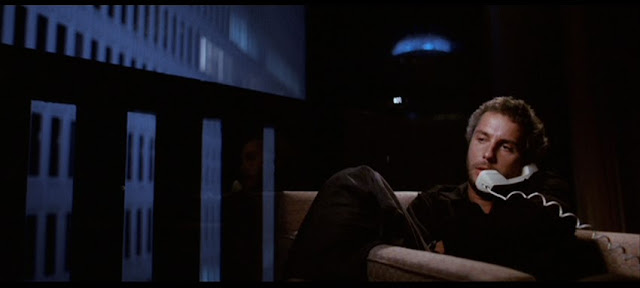
Lecktor calls Bloom's office.
Let us go back and look at Graham's meeting with Lecktor. At one point during their conversation, Will mentions that Dr. Bloom showed him an article that he (Lecktor) wrote for a psychiatry journal. At a later point, Graham says that Bloom is working on the Tooth Fairy case. After Graham has left, Lecktor has a phone brought to his cell and uses some trickery to get through to the AT&T operator. He then has the operator dial the University of Chicago Department of Psychiatry - Lecktor has that phone number memorized, and he gives it to the operator. When a woman answers the phone, he asks for Dr. Sydney Bloom - he knows Bloom's first name. He is informed that Dr. Bloom is not in, and, after asking for, and obtaining, the name of his secretary, is put through to her desk. Another woman answers, and tells him that the secretary (Martha) is not in nights.
Some of this scenario is fine insofar as one could guess that Lecktor already has knowledge of Dr. Bloom - this can be theorized from Graham's free use of Bloom's name while talking to Lecktor, and Lecktor not responding by saying, "Who?" Presumably, Lecktor has either read one or more journal articles by Bloom, or knows of him by reading about him. Thus, it doesn't seem surprising that he knew Bloom's first name. And, it's not surprising that he knows from his reading, where it is that Bloom works as well. But when we note that he has Bloom's phone number memorized, we must conclude that either Lecktor happened to see Bloom's phone number printed in a journal, which is not normal practice for magazine publishers, or that he has interacted with Bloom in the past, at least by phone, and for this reason has the number memorized.
We note that while Lectkor is speaking on the phone with the woman standing in for Martha, he sounds like he is somewhat familiar with the interior of Bloom's office, for example, he knows there is a call caddy on the secretary's desk. On the surface, the Manhunter audience is to infer that Lecktor knows that there are typically call caddies on secretary's desks, but when considering his certain knowledge that there is one on Martha's desk, together with the fact that he has memorized Bloom's phone number, it becomes evident that Lecktor has specific knowledge of Bloom and his office.
It is, in fact, the case that Lecktor has called Bloom from his cell in the past. This is why he showed no hesitation when using his technological trickery to get the phone call through to the AT&T operator - he knew exactly what he was doing, because he had done it before. Whenever Lecktor calls Bloom's office, he identifies himself as "Bob Greer, of Blaine and Edwards Publishing Company." This is actually the 'code name' he uses to converse with Bloom over the phone - obviously, he doesn't want other people in Bloom's office to know that Hannibal Lecktor is calling. Whenever Bloom hears this name, he knows it is Lecktor calling him.
However, a couple of questions arise with respect to the above: first, if Lecktor is familiar with Bloom's office, why does he have to ask for the name of the secretary (Martha King) when someone first answers the phone? Certainly, if he is so familiar with the office, he should know her name. And secondly, why does he call the office at night, when he should know that Dr. Bloom and Martha are not in?
With respect to the first question, his asking for her name ("What's his secretary's name again?") is designed to make the person on the other end believe that Lecktor ('Bob Greer') has called before, but that he is not a frequent caller. At the same time, Lecktor asking for the name 'sets up' the Manhunter audience so that once the phone conversation is further along, the entirety of it seems coherent to us; that is, we believe that this is all part of Lecktor's fooling the people on the other end (we are to think: "Once he has the secretary's name, he can pretend that he knows her when his call is passed through to Bloom's office...").
With respect to the second question above, that is, why Lecktor would call at night, when he would know that Bloom and Martha would not be in, the answer to this is that he did know this - his intention is to call while they are not there, and to get Graham's home address from whoever is standing in. He knows that if he asked Bloom for the address directly, Bloom would get suspicious as to why he wants it. And, if he asked Martha for the address, she might mention to Bloom while Lecktor is on the phone, that he is asking for Graham's address, which would also make Bloom suspicious.
In the next post, we will see what the implication is, of the fact that Lecktor and Bloom regularly interact with each other.










